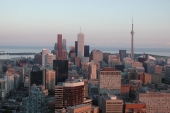
Last week, SAIL Capital Partners, a venture capital investment firm specializing in emerging cleantech energy projects, announced that former Toronto mayor David Miller has joined their advisory board. Toronto Standard spoke with Mr. Miller about his new role with SAIL, his ongoing work in the environmental sector and his life as a private citizen.
Tell me about SAIL and your new role on the advisory board.
First of all, I think that SAIL impressed me because they understand the opportunities that there are in Canada. We have the very interesting opportunities in new environmental technologies, particularly because of the existence of the federal program the SDTC (Sustainable Development Technology Canada), because of a lot of municipal leadership, because of the feed-in-tariff program in the province and because of the efforts being made to support the new environmentally friendly technology in the water area. I think SAIL’s presence here is a recognition from the US and from a serious organization of the opportunities that there are in Ontario and in Canada. My interest in this philosophically is that if we can support these emerging technologies, we can succeed in answering the question of our times, which is how can our economy work in harmony with our environment, not in opposition to it.
Does SAIL have any investments in Canadian companies already, or is that going to be your role, to guide them towards something like that?
My role is really is to help them expand their presence here in Canada. It’s up to Peter [Polydor, SAIL Vice President] to talk about any specific investments. They have people on the ground here who are doing that work. But also it’s advice about whether a potential investment or potential technology will work internationally in urban areas. If you think about the world at the moment, as of a couple of years ago, for the first time in our history more people live in urban areas than lived outside urban areas. Many of our environmental challenges, including climate change, can be addressed if we can get the energy supply to urban areas right, if we get building systems right and we get transportation right. There will be huge numbers of opportunities in that area. Because I had the huge privilege of chairing the C40 group on cities, I have a good sense internationally of where the interest lies. So, both those areas, internationally what woks in cities, on these really big economic and environmental challenges and to help grow their work in Canada.
Does your new role with SAIL compliment your ongoing projects, like your involvement with C40 Climate Leadership Group?
Yes. I decided when I determined not to run for mayor, that the area I wanted to focus on was this intersection of the environment and the economy. Al Gore told everybody what the problem is, I want to help produce the solution. In my role with the C40, in my role advising people like the World Bank, and in my role with Aird and Berlis, everything I‘m doing is about helping create real solutions to those challenges and that’s what interested me abut SAIL.
So is what you’re doing now something you couldn’t have done as mayor necessarily?
Well, I certainly couldn’t have been on the advisory board of a venture capital fund. The policies I supported as mayor were consistent with the growth of these kinds of businesses and innovations, and it’s a real pleasure to be on the other side and helping innovators succeed.
Looking at the other members of the advisory board, it seems that you’re one of the few with a public sector background. Others are coming from the private sector and academia. On a higher level, when it comes to developing sustainability solutions, who is leading right now? Is it the private sector or is it the public sector? Or what’s that relationship like?
There is significant leadership from cities, particularly around issues like buildings and transportation. There’s significant leadership from some states — BC has a carbon tax, Ontario has done a lot on energy. Not a lot of leadership at the national level. The private sector is starting to get it. People have understood that waste is waste. If you want to run an efficient business, you cut down on waste. That’s good for the environment and that’s good for the bottom line. If you think about carbon for a moment, one of the biggest emitters of carbon is the energy used to heat and cool buildings. And the building sector in some places has really started to understand – BOMA (Building Owners and Managers Association) in Canada, for example – if their new buildings are LEED or if their old buildings upgrade their energy systems, they energy retrofit, they’re going to save money, they’re going to increase the capital value of their properties and they’re significantly reduce the amount of carbon released into the atmosphere.
So I think there is good leadership in certain places at a city level – Toronto has a green building standard for example – and there’s good leadership certain places at the business level. But we need more, and that’s why these new and emerging technologies are so critical. You know, when you hear the President of Shell Canada say we need a carbon tax, that tells you there’s an incredible opportunity for technologies, not just for buildings or urban areas, but in the oil patch, and that’s why I think SAIL sees the opportunity here because a lot of the government programs are very supportive of the development of those new technologies, in particular the SDTC.
What specifically do you think the federal government could offer? What kinds of initiatives do they need to be looking at?
The SDTC has been a massive success, I think it should be recapitalized. They’ve got exactly the right model of government support where the private market won’t at an early stage, and it’s just working. So that would be one significant policy. Secondly, we need our energy system to change to a technology based system from an extraction based system. That’s what they’ve really done in Germany through their feed-in-tariff. People turned their houses or small businesses into little power plants. Ontario’s gone a little ways toward that, but for some technical and other reasons, it hasn’t been the success it is in Germany, and that’s critical. So, we need government policies that support the development of a smart grid, that allows small scale distributed generation, help the system be more resilient — there’s a safety issue here — and it significantly reduces carbon by using renewables.
The third thing we need is a continuation and expansion of incentives for energy saving and conservation, and that’s critical. City of Toronto has a program called Tower Renewal, about doing energy retrofits on aging apartment buildings. The payback’s about seven years, the private sector will invest when it’s two to three, sometimes four when the want a flagship project that gives them some credibility in the green area. You need the government to bridge those things, the buildings are here for a hundred years. So it’s economic, but the market isn’t producing the result. And if you did this program across Canada, you would have massive reductions in carbon and you’d have significant savings forever and you’d also rejuvenate the housing stock which needs it because these buildings were built in the 50s and 60s. Those are three areas I think are very important.
To change course a little bit, [on Friday] in the Toronto Sun, Sue-Ann Levy, who I’m sure you’re familiar with, kind of called you out a little bit. She called the sort of things you’re working on now, “A cozy little gig swanning around the world as an environmental lawyer and consultant” Is that a fair assessment?
Well, I won’t comment on Ms. Levy because she didn’t have the courtesy to interview me for that. But I am travelling, and I am working in the environmental area and helping small Canadian companies succeed. In my practice at Aird and Berlis, we’re counsel to SAIL, we do a lot of work ensuring that Canadian businesses get the financing they need to succeed and I think that’s very positive and I’m proud of that. And yes, I do provide advice to OECD, the United Nations environment program and the World Bank, because they’re interested in the same question. Most of the world is going to live in cities. How do we, in cities, improve the economy and the environment at the same time. It’s the challenge of our times and the experience I had as the mayor and as chair of the C40 is of interest to people because we found some solutions in Toronto. Things are moving slowly in some cities in the world, faster in others. But the solutions are there and that’s what I’m working on. And I find it quite exciting and I’m glad that in Canada we’ve got a lot of innovative entrpreneurs who are contributing to the solution as well.
The reason I bring it up is that, in a roundabout way, she talks about the office you had in London, England while you were still mayor for your role as C40 chair, she’s speaking about $140,000 a year. Basically the crux of her point was that, when you were the mayor and other mayors in the past weren’t receiving the same kind of scrutiny as our current mayor. Doug Holyday said, “None of the media ever did it against David Miller or Mel Lastman… Rob Ford is put under a magnifying glass a thousand times greater than anyone before him.” I’m sure you’ve been following the mayor’s recent — I don’t know what you’d describe it— the story that’s going on right now, do you think that’s a fair assessment?
I’m really sorry I’m not going to comment on any of that. I’m a private citizen now, I’m happy to comment on what I’m doing as a private citizen including that work with SAIL, but I’m just not going to talk about whether the press scrutinized me or not when I was mayor. I think if you go back and look at the articles that were written, it speaks for itself.
Okay. But in general are you enjoying your life post-mayor?
I’m lucky enough to be doing work I really believe in that’s making a very big difference and on top of that I coach my daughter’s soccer team and I’m able to catch my son’s events as well, and that was something I couldn’t do as mayor. It’s not possible, when you’re the mayor of Toronto to be present for your family when you always want to be. So I’m in a very lucky position to be doing some rewarding fulfilling work and seeing my kids grow up at the same time.
In the interest of full disclosure, Peter Polydor, SAIL Vice President, is the brother of Lee Polydor, Publisher of Toronto Standard.
____
Michael Kolberg is The Sprawl Editor at Toronto Standard. Follow him on Twitter for jokes @mikeykolberg
For more, follow us on Twitter at @torontostandard and subscribe to our Newsletter.














